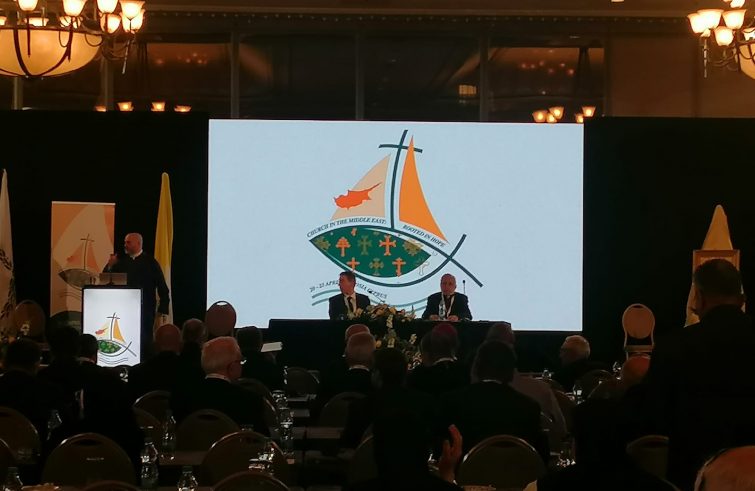
(Nicosia) “Greater communion between the Churches, increased concern for young people, educational commitment and transparency in asset management and its wise use.” For the Latin Patriarch of Jerusalem, Pierbattista Pizzaballa, those were the most relevant common grounds identified at the Symposium “Rooted in Hope”, which closed yesterday in Nicosia (Cyprus), promoted by ROACO – Riunione delle Opere di Aiuto alle Chiese Orientali (Assembly of Organizations for Aid to the Eastern Churches), to mark the 10th anniversary of Benedict XVI’s Post-Synodal Apostolic Exhortation “Ecclesia in the Medio Oriente” signed in Harissa (Lebanon) on September 14, 2012. Over 250 representatives of the Catholic Churches in the Middle East, including patriarchs, bishops, priests and members of religious institutes and lay movements attended the meeting.
Unique opportunity for communion. “It was a meaningful opportunity to voice our views, a time of sharing, after 10 years, amid entities that rarely meet,” the Patriarch told SIR, outlining some of the common grounds that were identified during the meeting. “The first point, that saw the joint consensus of all participants, concerns the need for greater communion among the Churches that must be reflected also in practical steps. For instance, all the Catholic Churches should adopt the same version of the Lord’s Prayer; they should share statistical data and information; and they should intensify cooperation in the area of education. Given the transformations, including some dramatic ones, of the past few years, I believe that no Church can resolve her problems alone. Let there be no more grievances.” The Patriarch reiterated that the Synodal path is “a unique opportunity” for communion, “to understand what the new generations want” and to identify “those with whom we can work.” At the Symposium, young people were referred to as a sort of ‘vulnus‘, a wound. If that is truly the case, the wound must be healed by promoting paths of Christian formation centred on a catechesis that has been re-thought for our times. Formation, Pizzaballa added, “is a way of living the Church that cannot be separated from vocation. We have entered a positive process whose fruits will not be seen immediately but which, I am sure, over time, will bring about a new style also in the Middle East. It will be the responsibility of the Church ministers to steer this process. Our churches, our communities, are our primary interlocutors”, concluded the Patriarch of Jerusalem. “Over the past few days, it was said that a good believer is also a good citizen. It is our duty to overcome the minority complex and be actively involved in the life of our societies. What’s important is not how many of us are there but what we have to say – as a community – for the future of our churches and our nations.”
The gaze of faith. Father Francesco Patton, Custos of the Holy Land, attending the Symposium, agrees that the apostolic Exhortation “Ecclesia in Medio Oriente” retains “great topical relevance and foresight extending beyond the present time. This can be seen in the themes such as the transmission of the faith, young people, migrants, formation, the role of women, the management of temporal goods, communion and vocation, all of which were discussed at length in Nicosia.” The defining events of the past decade have reshaped the Middle East, which “is no longer the place we used to know only twenty or thirty years ago. Today, it is a region of destination for millions of migrant workers, and millions of Christian migrant workers. New churches are emerging throughout the region”, the Custos said. “While on the one hand we are witnessing, with concern, an exodus of members of ancient Churches, on the other we are witnessing the arrival of new Christians on our lands. The challenge ahead of us is integration inside the Church.” For Father Patton, the same applies to “young people, who must feel that they participate fully in the life of the Church and not be just the recipients of something, and to women, who have a lot to give to the life of the Church and to Church mission.” For the Franciscan priest, “the habit to complain, sometimes an ecclesial habit,” must cease in order to bear witness to “the personal encounter with the Risen Christ. This experience of faith brings with it the ability to spread hope and to look to the future with the gaze of faith.” The symposium in Nicosia “offered a significant opportunity for synodality, for the exercise of listening to one another is fundamental both inside the Church and in the complex reality of the Middle East, where the need for dialogue between Churches goes hand in hand with the dialogue with Islam and Judaism.” The theme of citizenship is closely linked to the dialogue with Islam, and it will be recognised when “Muslim-majority countries will acknowledge the notion of citizenship, as endorsed by the highest Sunni authority Ahamad al-Tayyib, and by Pope Francis in the Abu Dhabi document. On that day, Christians will no longer be afraid to be a minority group in Muslim societies. For this to happen, we must urge everyone to do their share, including ecclesiastical diplomacies whose efforts should be carried out in conjunction with national governments.”










